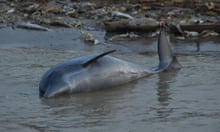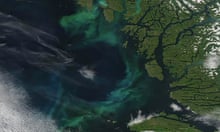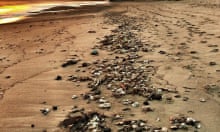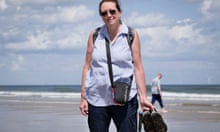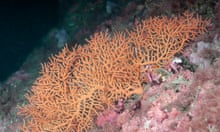Seals, dolphins and seabirds in British coastal waters are increasingly being disturbed by people using drones, kayaks and jetskis, according to a new report.
Plastics, ocean waste and discarded fishing equipment have continued to devastate marine species in the UK’s coastal waters, while warming seas driven by the climate crisis have caused a boom in the non-native Pacific oyster, according to the Wildlife Trusts.
The organisation’s annual summary of conservation work by volunteers, citizen scientists and marine wildlife teams aims to monitor the health of marine ecosystems around the British Isles.
Reports to trusts about human wildlife disturbances have surged in recent years, with the latest hotline figures showing 245 serious incidents, most of which involved seals. In February, dolphins were harassed by jetskiers in Falmouth. The organisation warned that trauma from human disturbances can separate parents from their young and disrupt successful breeding and feeding.

Joan Edwards, the Wildlife Trusts’ director of living seas, said: “People don’t realise how vulnerable animals such as dolphins and seals are to human activity. We share the seas with nature and need to leave space for marine wildlife – it’s important that people keep a good distance from animals and seabirds and avoid kayaking, jetskiing or boating near to animals, and avoid mothers and their young.”
Industrial plastic, particularly small pellets known as nurdles that marine wildlife and seabirds often confuse for food, continued to harm ecosystems around the British Isles, according to the review. In November, hundreds of thousands of nurdles washed up on Kimmeridge Bay, a protected part of the coast in Dorset.
Marine rubbish collected on Handa Island reserve off the Scottish coast was traced back to North America, Ireland, Sweden and Spain, including lobster pot tags from Newfoundland.
Julie Hatcher, Dorset Wildlife Trust’s people and wildlife officer, said: “When the sea is rough on a winter’s day, nurdles are washed up in astonishing numbers – it’s extremely disheartening and hard to imagine how we will ever get rid of them. They’re just one part of the ocean plastics nightmare.”
The Pacific oyster has also enjoyed a boom in the coastal waters in southern England, with large increases in Cornwall and Devon recorded in the past five years. Conservationists warn that reefs formed by the invasive species smother intertidal gravel and mudflats, making it difficult for birds and young fish to forage.
Matt Slater, the marine awareness officer at Cornwall Wildlife Trust, said: “Originally, Pacific oyster farmers were officially advised that our waters weren’t warm enough for them to reproduce, but due to climate change that advice is out of date. Pacific oyster populations have increased hugely in Cornwall and Devon in the last five years and it’s unrealistic to think we’ll be able to eradicate this species, so we’re going to have to manage them the best we can. There are big feral populations on the coasts of Kent and Essex too.
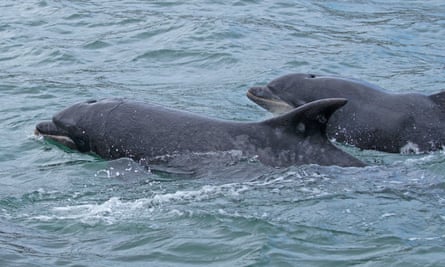
“This is a cautionary tale, showing the unforeseen consequences of introducing new species, and particularly the effect a changing climate is having on marine ecosystems.”
However, it was not all bad news. The Wildlife Trusts praised a change in the public’s attitude about the climate crisis and biodiversity loss in 2019, with thousands of volunteers helping to conduct surveys and clear marine and plastic pollution from beaches.
Edwards said: “2019 saw a sea change in people’s attitudes. The extent of the nature and climate emergency is becoming increasingly clear and more people than ever are volunteering to be citizen scientists and conducting important surveys or taking action to tackle the profound problems of marine litter and plastic pollution.”
A new citizen science project recording sightings of whales, dolphin and porpoises on the Yorkshire coast was a particular success for the organisation, which represents 46 regional wildlife charities. The survey recorded 320 individual sightings of minke whales, bottlenose dolphins and harbour porpoises.

More good news from the annual review included an increase in the number of grey seals at South Walney nature reserve in Cumbria. There were only two in 1981, whereas they now number 483, including seven pups. Sandwich terns also had a successful breeding year at North Wales Wildlife Trust’s Cemlyn Bay, with 800 chicks fledging compared with 180 chicks the year before.
Wildlife Trusts organised 450 beach cleans last year, with Sussex Wildlife Trust logging 19,000 pieces of litter weighing 350kg.
The organisation welcomed the creation of 41 new marine conservation zones in the UK this year, bringing the total to 91, but said more should be done to protect cold water corals, forests of sea fans, rocky canyons and sandbanks around the coast.



